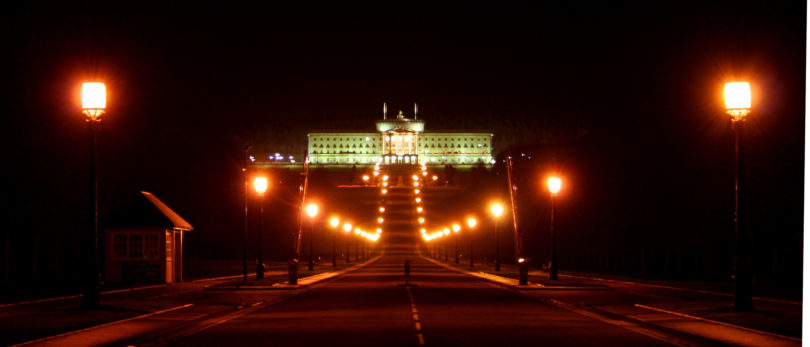Tory Foreign Secretary Liz Truss is the most popular choice to succeed Boris Johnson as PM if he is forced out, according to a recent poll of Conservative party members. Her potential leadership bid adds another layer of chaos and complexity to the Brexit negotiations.
Since taking over as chief Brexit negotiator, Truss has repeatedly threatened to trigger Article 16, which suspends the Northern Irish protocol and unpicks a key part of the Brexit withdrawal agreement. Threatening to trigger a trade war with the EU may make Truss popular with the ani-European wing of her own party, but it is a risky strategy that could bring chaos to our already weakened import/export trade.
Even if it is a hollow threat, it doesn’t support the protocol – which in economic terms at least seems to be working. And planning to effectively destabilise Northern Ireland may not go down well – last month an Ashcroft poll found that two-thirds of inhabitants of the province say Brexit has increased the likelihood of reunification.
An Irish border poll is a matter for the people of Ireland – so what about Scotland?
The Good Friday Agreement mandates that there should be a border poll when there appears to be majority support for reunification. In that case, the UK Government is supposed to remain neutral on the outcome, which is regarded as a matter for the people of Ireland. (This poll can take place every seven years if required.)
This may have the side effect of making the position of both the Conservative and Labour parties with regard to Scotland look unbalanced – for how long would they then be able to argue that Scotland should not be allowed to hold a poll on its own future if Northern Ireland can?
The danger of a chaotically unraveling Brexit
B ut it would be naive to underestimate the risk to the Good Friday agreement that a chaotically unraveling Brexit deal would present. Some onlookers are concerned that DUP leader Jeffrey Donaldson has already begun stoking the fires of sectarianism in a desperate electoral campaign for Stormont elections in May when polling shows Sinn Fein is likely to be the largest party for the first time.
ut it would be naive to underestimate the risk to the Good Friday agreement that a chaotically unraveling Brexit deal would present. Some onlookers are concerned that DUP leader Jeffrey Donaldson has already begun stoking the fires of sectarianism in a desperate electoral campaign for Stormont elections in May when polling shows Sinn Fein is likely to be the largest party for the first time.
In a piece entitled “North’s politics take a dark turn in sectarian direction”, Irish Times writer Susan McKay said Donaldson was condoning sectarian posturing used in a pamphlet with a preface by Kate Hoey. Hoey was appointed to the peerage by Boris Johnson and is now Baroness of Rathlin.
McKay wrote: “The report’s author, Jamie Bryson … urged Unionists to get themselves into the professions and, once installed, to “weaponise” their power, to retaliate against nationalists. Unionists were to do this “ruthlessly and relentlessly” with “no goodwill or balance” and not “a hint of shame”.” Bryson is among many who talk of collapsing Stormont. Hoey has also said the agreement was “not sustainable”.
Stormont has little more power than a council – but is politically significant
If the Unionists do collapse Stormont, it may have little effect on the day-to-day administration of Northern Ireland. The Parliament administers less than ten percent of the tax take of the region, similar to an English council, much less than Holyrood. But it would be a sign that the power-sharing arrangements of the Good Friday Agreement were under strain.
Northern Ireland’s economy has boomed due to the protocol
Despite the incendiary rhetoric of some in the Unionist movement, the Northern Irish protocol seems to be working in terms of the Northern Irish economy, which has recovered to pre-pandemic levels and is outperforming the rest of the UK. Polling last autumn showed that support for the protocol among people in Northern Ireland had grown significantly and was at 52%.
The import controls that were put in place for goods coming into the UK from the EU on Jan 1 this year have been delayed for Ireland. That could cause more issues – but the UK government can suspend them indefinitely if it so chooses. Brexit has already increased the amount of trade that takes place between Northern Ireland and the rest of the island.
Ireland’s economic success may encourage support for reunification
Ireland’s sustained economic success may also encourage northerners to see a more prosperous and stable future in reunification. The latest UN Human Development Rankings put Ireland at number three in the world. That is a misleading ranking in some ways – many Irish people would dispute that their country is the richest in the EU and the country’s GDP is distorted because of the number of multinational companies who have brass plate European headquarters in Dublin.
However, comparing the detailed rankings against the UK (Scotland is not ranked separately) shows Ireland pulling ahead on several measures. Ireland has a higher life expectancy – 81.2 in the UK and 82.3 in Ireland. Ireland’s infant mortality rate is lower at 3.1 per 1,000 births compared to 3.6 in the UK, and Irish children born now can expect an extra year in education.
Irish economic resilience is based on EU membership
A look at historic data shows the Republic of Ireland has become economically stronger as the proportion of its export trade in goods with the UK became a smaller proportion of its overall trade. Export figures from the Irish Central Statistics Office show that in 1973 – when the UK and Ireland joined the European Community – Ireland exported nearly 55% of its goods to the UK. Now, with a more diverse economy, 90% of the country’s exports are to non-UK destinations.
Over the last couple of years, Ireland has also been able to successfully reconfigure much of its freight trade to avoid the land bridge with the UK which would necessitate dealing with costly Brexit paperwork and checks.
Ireland is no longer alone at the negotiating table
But the big difference for the UK in negotiations with Ireland now and in the past is that Ireland is no longer alone at the table. When Ireland was carved up in the Anglo Irish Agreement of 1921, the negotiating team led by Michael Collins had little clout. They were desperate to avert a threatened overwhelming attack on Ireland.
This time around, the EU has made it clear that it will not make further concessions to the Westminster government. President Joe Biden has also indicated that any move by the UK Government to try to put the border with the EU across the island of Ireland would be strongly opposed by the US.








